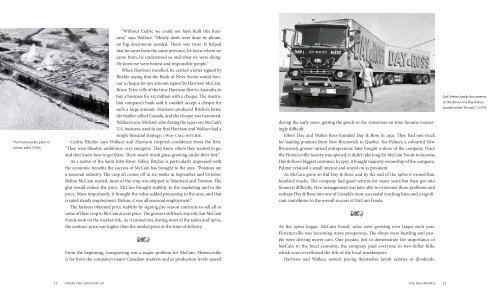From the Ground Up - McCain Foods Limited
From the Ground Up - McCain Foods Limited
From the Ground Up - McCain Foods Limited
Create successful ePaper yourself
Turn your PDF publications into a flip-book with our unique Google optimized e-Paper software.
The Florenceville plant in<br />
winter, early 1970s.<br />
“Without Cedric we could not have built this business,”<br />
says Wallace. “Mostly deals were done by phone,<br />
no big documents needed. There was trust. It helped<br />
that he came from <strong>the</strong> same province, he knew where we<br />
came from, he understood us and what we were doing.<br />
He knew we were honest and responsible people.”<br />
When Harrison travelled, he carried a letter signed by<br />
Ritchie saying that <strong>the</strong> Bank of Nova Scotia would honour<br />
a cheque for any amount signed by Harrison <strong>McCain</strong>.<br />
Bruce Terry tells of <strong>the</strong> time Harrison flew to Australia to<br />
buy a business for $15 million with a cheque. The Australian<br />
company’s bank said it couldn’t accept a cheque for<br />
such a large amount. Harrison produced Ritchie’s letter,<br />
<strong>the</strong> banker called Canada, and <strong>the</strong> cheque was honoured.<br />
Wallace’s son, Michael, who during <strong>the</strong> 1990s ran <strong>McCain</strong>’s<br />
U.S. business, used to say that Harrison and Wallace had a<br />
simple financial strategy: 1-800-CALL-RITCHIE.<br />
Cedric Ritchie says Wallace and Harrison inspired confidence from <strong>the</strong> first.<br />
“They were likeable, ambitious, very energetic. They knew where <strong>the</strong>y wanted to go,<br />
and <strong>the</strong>y knew how to get <strong>the</strong>re. There wasn’t much grass growing under <strong>the</strong>ir feet.”<br />
As a native of <strong>the</strong> Saint John River Valley, Ritchie is particularly impressed with<br />
<strong>the</strong> economic benefits <strong>the</strong> success of <strong>McCain</strong> has brought to <strong>the</strong> area. “Potatoes are<br />
a seasonal industry. The crop all comes off in six weeks in September and October.<br />
Before <strong>McCain</strong> started, most of <strong>the</strong> crop was shipped to Montreal and Toronto. The<br />
glut would reduce <strong>the</strong> price. <strong>McCain</strong> brought stability to <strong>the</strong> marketing and to <strong>the</strong><br />
price. More importantly, it brought <strong>the</strong> value-added processing to <strong>the</strong> area, and that<br />
created steady employment. Before, it was all seasonal employment.”<br />
The farmers obtained price stability by signing pre-season contracts to sell all or<br />
some of <strong>the</strong>ir crop to <strong>McCain</strong> at a set price. The growers still had crop risk, but <strong>McCain</strong><br />
<strong>Foods</strong> took on <strong>the</strong> market risk. As it turned out, during most of <strong>the</strong> 1960s and 1970s,<br />
<strong>the</strong> contract price was higher than <strong>the</strong> market price at <strong>the</strong> time of delivery.<br />
<strong>From</strong> <strong>the</strong> beginning, transporting was a major problem for <strong>McCain</strong>. Florenceville<br />
is far from <strong>the</strong> company’s major Canadian markets and as production levels soared<br />
during <strong>the</strong> early years, getting <strong>the</strong> goods to <strong>the</strong> customers on time became increasingly<br />
difficult.<br />
Elbert Day and Walter Ross founded Day & Ross in 1950. They had one truck<br />
for hauling potatoes from New Brunswick to Quebec. Joe Palmer, a colourful New<br />
Brunswick grower turned entrepreneur, later bought a share of <strong>the</strong> company. Once<br />
<strong>the</strong> Florenceville factory was opened, it didn’t take long for <strong>McCain</strong> <strong>Foods</strong> to become<br />
Day & Ross’s biggest customer. In 1965, it bought majority ownership of <strong>the</strong> company;<br />
Palmer retained a small interest and stayed on as president.<br />
As <strong>McCain</strong> grew, so did Day & Ross, and by <strong>the</strong> end of <strong>the</strong> 1960s it owned four<br />
hundred trucks. The company had good returns for many years but <strong>the</strong>n got into<br />
financial difficulty. New management was later able to overcome those problems and<br />
reshape Day & Ross into one of Canada’s most successful trucking lines and a significant<br />
contributor to <strong>the</strong> overall success of <strong>McCain</strong> <strong>Foods</strong>.<br />
As <strong>the</strong> 1960s began, <strong>McCain</strong> <strong>Foods</strong>’ sales were growing ever larger each year.<br />
Florenceville was becoming more prosperous. The shops were bustling and people<br />
were driving newer cars. One payday, just to demonstrate <strong>the</strong> importance of<br />
<strong>McCain</strong> to <strong>the</strong> local economy, <strong>the</strong> company paid everyone in two-dollar bills,<br />
which soon overflowed <strong>the</strong> tills of <strong>the</strong> local storekeepers.<br />
Harrison and Wallace weren’t paying <strong>the</strong>mselves lavish salaries or dividends.<br />
32 <strong>From</strong> <strong>the</strong> <strong>Ground</strong> up<br />
t he BeG inninG 33<br />
Gail Seeley hands documents<br />
to <strong>the</strong> driver of a Day & Ross<br />
double trailer “B-train,” c.1970.






